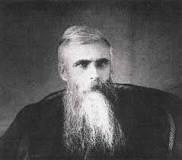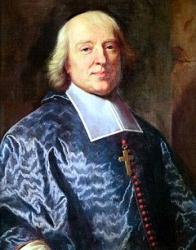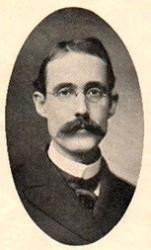Planning worship?
Check out our sister site, ZeteoSearch.org,
for 20+ additional resources related to your search.
- |
User Links
Person Results
Thomas Lake Harris

1823 - 1906 Author of "O earth, thy past is crowned and consecrated" in Hymns of the Spirit for Use in the Free Churches of America Harris, Thomas Lake, born May 15, 1823. Under his name three hymns are given in the American Unitarian Hymns of the Spirit, 1864:—(1) "In every human mind we see" (The Soul God's Temple); (2) "Look up, O man, behold the same" (God All in All); (3) "O earth, thy past is crowned and consecrated" (Past, Present and Future).
--John Julian, Dictionary of Hymnology, Appendix, Part II (1907)
=====================
Harris, T. L., p. 1569, ii., was born at Stony Stratford, Bucks, and when three years of age went with his parents to America. He died at New York, March 23, 1006. His hymns were published as Hymns of Spiritual Devotion, N.Y., 1858. In his Preface, he says, "Many of the hymns were verbally communicated by individual spirits." [Rev. James Mearns, M.A.]
--John Julian, Dictionary of Hymnology, New Supplement (1907)
Thomas Lake Harris
Shepherd Knapp
1873 - 1946 Author of "Lord God of Hosts, Whose purpose, never swerving" in A Treasury of Hymns Born: September 8, 1873, New York, New York.
Died: January 11, 1946.
Knapp attended Columbia College (graduated 1894) and Yale College (BD 1897). He served at the First Congregational Church in Southington, Connecticut (1897-1900); the Brick Presbyterian Church in New York City (assistant pastor, 1901-03); and the Central Congregational Church, Worcester, Massachusetts (1908-36). His works include:
History of the Brick Presbyterian Church, 1908
On the Edge of the Storm, 1921
Old Joe and Other Vesper Stories, 1922
The Liberated Bible: The Old Testament, 1941
--www.hymntime.com/tch
Shepherd Knapp
Frederick Lucian Hosmer

1840 - 1929 Person Name: Frederick Lucian Hosmer (1840- ) Author of "Father, to thee we look in all our sorrow" in The University Hymn Book Hosmer, Frederick Lucian, B.A., was born at Framingham, Mass., in 1840, and educated at Harvard, where he graduated B.A. in 1869. Entering the Unitarian Ministry in 1872 he has held charges in Quincy, Ill., 1872-77; Cleveland, Ohio, 1878-92; St. Louis, 1894-99; and since 1899, at Berkeley, Cal. His Way of Life, 1877, was a compilation of Prayers and Responsive Services for Sunday Schools. Of Unity Hymns and Carols, 1880, he was joint editor with W. C. Gannett and J. V. Blake. His hymns were published jointly by him and W. C. Gannett (q.v.), as The Thought of God in Hymns and Poems (Boston: Little, Brown & Co.), 1st Series, 1885; 2nd Series, 1894. Of his 56 hymns in this work the following have come into common use, for the most part during the past ten years:—
1. Father, to Thee we look in all our sorrow. [Trust in God.] Written in 1881 upon the death of a member of the author's congregation, and published in The Thought of God, 1st Series, 1885.
2. From age to age how grandly rise. [Unity.] Written for the annual festival of the Free Religious Assoc, Boston, June 2, 1899, and first published in Souvenir Festival Hymns, 1899. Subsequently altered by the author to "From age to age the prophet's vision."
3. From age to age they gather, all the brave of heart and strong. [Victory of Truth.] "Written in 1891 for the Dedication of Unity Church, Decorah, Iowa, and published in The Thought of God, 2nd Series, 1894.
4. From many ways and wide apart. [College or School Reunion.] Dated in The Thought of God, 2nd Series, 1894, as having been written in 1890.
5. Go not, my soul, in search of Him. [God Within.] Written in 1879, printed in the Boston Christian Register, May 31, 1879, and included in The Thought of God, 1st Series, 1885, with the title, "The Indwelling God."
6. I cannot think of them as dead. [Eternal Life.] Written in 1882, and first published in The Thought of God, 1st Series, 1885, and entitled "My Dead." in the English collections it is usually given as "We cannot think of them as dead."
7. I little see, I little know. [Trust.] "A Psalm of Trust," written in 1883, first appeared in the Boston Christian Register, and again in The Thought of God, 1st Series, 1885.
8. Immortal by their deed and word. [The Spirit of Jesus.] Written in 1880, and first published in Unity Hymns and Carols, Chicago, Ill., 1880, and then in The Thought of God, 1st Series, 1885.
9. Many things in life there are. [Mystery in all Things.] Written in 1885, and first published in The Thought of God, 1st Series, 1885, with the title "Passing Understanding," and the quotation "The Peace of God which passeth all understanding."
10. Not always on the mount may we. [On the Mount.] This lesson from the Transfiguration was written in 1882, and published in the Chicago Unity, April 1, 1884. After revision by the author, it was included in the 1st Series of The Thought of God, 1885.
11. Not when, with self dissatisfied. [Lent.] Written in 1891, and given in The Thought of God, 2nd series, 1894, p. 33. It is in The Public School Hymn Book, 1903, and others.
12. O beautiful, my country. [National Hymn.] As “Our Country," written in 1884, and published in the Chicago Unity Festivals, 1884; and again in The Thought of God, 1885.
13. O Light, from age to age the same. [Dedication Anniversary.] Written in 1890 for the fiftieth anniversary of the Second Congregational Church (Unitarian), Quincy, 111. Included in The Thought of God, 2nd Series, 1894, and entitled "From Generation to Generation."
14. O Lord of Life, where'er they be. [Life in God.] "Written in 1888 for Easter service in Author's own church," and first published in the Chicago Unit, and again in The Thought of God, 2nd Series, 1894. The "Alleluia!" refrain, which is added in some collections to each verse, is appended, in the original, to the last verse only.
15. O Name, all other names above. [Trust in God.] Under the title "Found. 'They that know Thy name will put their trust in Thee!’ this hymn, written in 1878, was given in The Thought of God, 1st Series, 1885.
16. O Prophet souls of all the years. [Unity.] “Written in 1893 for, and sung at, the Unitarian gathering in connection with The World's Parliament of Religions (World's Fair), Chicago, Sep., 1893," and included in The Thought of God, 2nd Series, 1894, and entitled "One Law, One Life, one Love."
17. O Thou, in all Thy might so far. [God All in All.] This hymn, given in The Thought of God, 1st Series, 1885, with the title "The Mystery of God," was written in 1876, and first published in the New York Inquirer.
18. O thou in lonely vigil led. This encouragement for lonely workers was written for the "Emerson Commemoration, W. U. C, 1888," and included in The Thought of God, 2nd Series, 1894.
19. O Thou, Who art of all that is. [Divine Guidance.] Under the title "Through unknown paths," this hymn was included in The Thought of God, 1st Series, 1885. It was written in 1877.
20. O Thou, Whose Spirit witness bears. [Dedication of a Place of Worship.] Written for the Dedication of First Unitarian Church, Omaha, Feb. 6, 1891, and published in The Thought of God, 2nd Series, 1894, with the title "The Inward Witness," and the subscription "For T. K., Omaha, 1801."
21. On eyes that watch through sorrow's night. [Easter] A Carol for Easter Morn, written in 1890 for the author's congregation, and published in The Thought of God, 2nd Series, 1894.
22. One thought I have, my ample creed. [The Thought of God.] This is the initial hymn to the collection The Thought of God, 1st Series, 1885, and supplies the title to the work. It was written in 1880, and first published in the Chicago Unity Hymns and Carols, 1880, and then in The Thought of God, 1885.
23. The rose is queen among the flowers. [Flower Service.] "Written in 1875, first published in The Sunnyside, a song book for Sunday Schools, and again in The Thought of God, 1st Series, 1885, under the title "Flower Sunday."
24. Thy kingdom come, — on bended knee. [Missions.] "Written in 1891 for the Commencement of the Meadville Theological School (Meadville, Pa.), June 12, 1891, and published in The Thought of God, 2nd Series, 1894," under the title "The Day of God," and the subscription, "M. T. S., June 12, 1891."
25. We pray no more, made lowly wise, For miracle and sign. [Greater Faith Desired.] Written in 1879, and first published in The Christian Register (Boston), Mar. 22 of that year, under the title 'The Larger Faith.'" Included under the same title in The Thought of God, 1st Series, 1885. Sometimes given as "Made lowly wise, we pray no more."
26. When courage fails, and faith burns low. [Victory of Truth.] Under the title "Loyalty," this hymn was given in The Thought of God, 1st Series, 1885. It was written in 1881.
27. Where men on mounts of vision Have passed the veil within. [Dedication of a Place of Worship.] "Written in 1891 for the Dedication of First Unitarian Church, Oakland, California." Included in The Thought of God, 2nd Series, 1894, entitled "Holy Places," and subscribed " For C. W. W., Oakland, Cal., 1891."
These annotations are from manuscript notes supplied to us by the author. Of these hymns all are in common use in America, and more than one half in Great Britain, mainly by Unitarians and Congregationalists. Amongst Unitarian hymn-writers of the last twenty years Mr. Hosmer is the most powerful and original known to us.
--John Julian, Dictionary of Hymnology, New Supplement (1907)
Frederick Lucian Hosmer
St. Anatolius. of Constantinople

? - 458 Person Name: Anatolius Author of "The day is past, the shadows round are falling" in At Worship Anatolius, one of the Greek hymn-writers. No details are known of him. From the fact that he celebrates martyrs who died in the 6th and early part of the 7th century, it is certain that he is not to be identified (as by Neale) with the patriarch who succeeded Flavian in 449, and afterward procured the enactment of the famous canon of the Council of Chalcedon, which raised Constantinople to the second place among the patriarchal sees (Dict. of Ch. Biog., i. p. 110). A letter is said to exist showing that he was a pupil of Theodore of the Studium (759-826). More than a hundred hymns, all of them short ones, are found in the Mensea and Octoechus. From this account, derived from Anth. Graec. Garm. Christ, p. xli, it will be seen that his poems cannot be considered "the spring-promise" of the age of the Canons (Neale). A few of his hymns have been translated by Dr. Neale in his Hymns of the Early Church, and Dr. Littledale, in the Offices of the Hymns of the Early Church: ("Fierce was the wild billow") and ("The day is past and over").
[Rev. H. Leigh Bennet, M.A.]
-- John Julian, Dictionary of Hymnology (1907)
St. Anatolius. of Constantinople
Margaret Cockburn-Campbell
1808 - 1841 Person Name: Margaret Cockburn-Campbell, 1808-1841 Author of "Praise ye Jehovah, praise the Lord most holy" in The Book of Praise Campbell, Margaret, Lady Cockburn, née Malcolm, eldest daughter of Sir John Malcolm, G.C.B., married, June 20, 1827, to Sir Alexander Thomas Cockburn-Campbell, Bart, (one of the founders of the Plymouth Brethren in England), and died at Alphington, near Exeter, Feb. 6, 1811. Her hymns were printed in lithograph from her manuscript for private circulation. In the Plymouth Brethren Psalms & Hymns, Lond., Walther, 1842, some of these hymns were given, and thus came into common use. The best known is, "Praise ye Jehovah, praise the Lord most holy."
--John Julian, Dictionary of Hymnology (1907)
Margaret Cockburn-Campbell
F. R. Tailour
Author of "The King, O God, his heart to thee upraiseth" in Songs of Praise
F. R. Tailour
Jacques Bridaine

1701 - 1767 Person Name: Jacques Bridaine, 1701-1767 Author of "My Lord, my Master, at Thy feet adoring" in The Hymnary of the United Church of Canada Jacques Bridaine (21 March 1701 in Chusclan – 22 December 1767 in Roquemaure) was a French Roman Catholic preacher.
Having completed his studies at the Jesuit college of Avignon he entered the Sulpician Seminary of the Royal Missions of St. Charles of the Cross. Soon after his ordination to the priesthood in 1725, he joined the Missions Royales, organized to bring back to the Catholíc faith the Protestants of France. For over forty years he visited as a missionary preacher almost every town of central and southern France. When only in minor orders, he was assigned as Lenten preacher in the Church of Aigues-Mortes.
It was at Aigues-Mortes where his extreme youth provoked the derision of the people and when Ash Wednesday arrived, the church was empty. Undismayed, he put on his surplice and went out in the principal streets, ringing a bell, and inviting the people to hear him. He succeeded in filling the church with congregants who came out of curiosity but when he began in a most unusual fashion by singing a canticle about death the congregation burst out in loud laughter; whereupon he denounced the congregation. He was characteristically sensational. He wrote little and gave way to the inspiration of the moment and as a consequence his utterances at times were an incoherent jumble of incongruous figures and ideas, which clashed with each other and were often even grotesque.
It was Cardinal Maury who called attention to his exordium in the sermon on Eternity which was said to be improvised. Father Cahour, S.J., inserted it in his Chefs-d'Oeuvre d'éloquence, and Maury who wrote it from memory declared that it was worthy of Bossuet or Demosthenes. It was proclaimed at St. Sulpice before an audience of dignitaries. Nevertheless, Bridaine denounced the assembly as sinners, and bade them to tremble before him, "Today I hold your condemnation in my hand." Opinions were divided about the oratory; some finding a self-consciousness in it which was unapostolic.
He was renowned for having a sonorous and penetrating voice that could easily be heard by an audience of ten thousand people. He tended towards great theatrics to engage his audience. A supreme instance of these "methods" as he called them, and which he always insisted upon being carried out, is narrated by Madame Necker in the Nouveaux Mélanges (I, 138). He had just delivered a stirring discourse when addressing himself to the great procession which had followed him he said: "I am now going to bring you home" and he led them to the grave-yard.
In the course of his life he preached two hundred and fifty-six missions, traveling to almost every town of France in the performance of his work. Pope Benedict XIV gave him permission to preach anywhere in Christendom. Medals were struck in his honor, and the most distinguished prelates showed him the greatest reverence and affection. His Cantiques Spirituels passed through forty-seven editions, in use in most French churches. He has also left five volumes of sermons (ed. Avignon, 1823; Paris, 1861). The Protestants of France are said to have been particularly friendly to him, because of the many good offices he performed in their regard. For fourteen years he followed the spiritual guidance of a missionary like himself named Mahistre. In 1742 Cardinal Fleury proposed to establish a missionary congregation for all France under the direction of Bridaine, but the death of the cardinal caused the project to fall through.
In Paris, in 1744, his sermons created a deep impression. France was wild with excitement about him. His appeals were so powerful that in a mission which he preached at Chalon-sur-Saône in 1745 there were restitutions to the amount of 100,000 francs. His reputation as an orator was so great that even Massillon was unwilling to preach in his presence. In the course of his missions he established what he called "peace tribunals", courts composed of some of his associate missionaries, a number of irreproachable laymen, and the parish priest. To these courts all disputes were submitted and the decisions were accepted as final. His life was written by the Abbé Carron. The book was frequently translated into English, the first edition published in 1831.
--en.wikipedia.org/wiki/
Jacques Bridaine
Robert Tailor
Person Name: F. R. Tailour Author of "The King, O God, his heart to thee upraiseth" in The English Hymnal
Robert Tailor
Marion Franklin Ham

1867 - 1956 Author of "Touch thou mine eyes" in Hymns of the Spirit for Use in the Free Churches of America Born: February 18, 1867, Harveysburg, Ohio.
Died: July 23, 1956, Arlington, Massachusetts.
Buried: Mount Auburn Cemetery, Cambridge, Massachusetts.
Ham began his career as a journalist and bank clerk in Chattanooga, Tennessee. Ordained a Unitarian minister in 1898, he pastored in Chattanooga (1898-1904); at the First Church in Dallas, Texas (1904-09); and in Reading (1909-34), Waverly (1934-42), and Gardner, Massachusetts (1943-45). The Meadville Theological School in Chicago, Illinois, awarded him a Doctor of Divinity degree in 1942, the year he retired. Ham’s works include:
The Golden Shuttle, 1896
The Kinchin Stories, 1914
Songs of the Spirit, 1932
Songs of Faith and Hope, 1940
O Mother-Heart, 1941
Keeper of the Flame, 1945
Freedom, 1950
Songs at Sunset, 1951
Songs of a Lifetime, 1953
In a Rose Garden, 1954
www.hymntime.com/tch/
Marion Franklin Ham


 My Starred Hymns
My Starred Hymns


